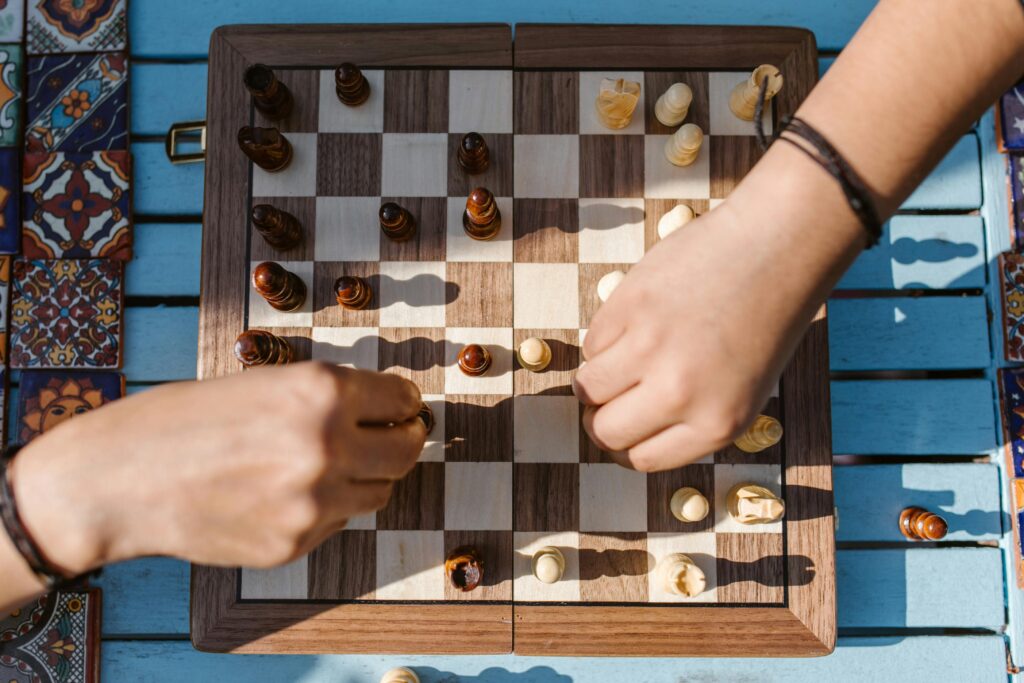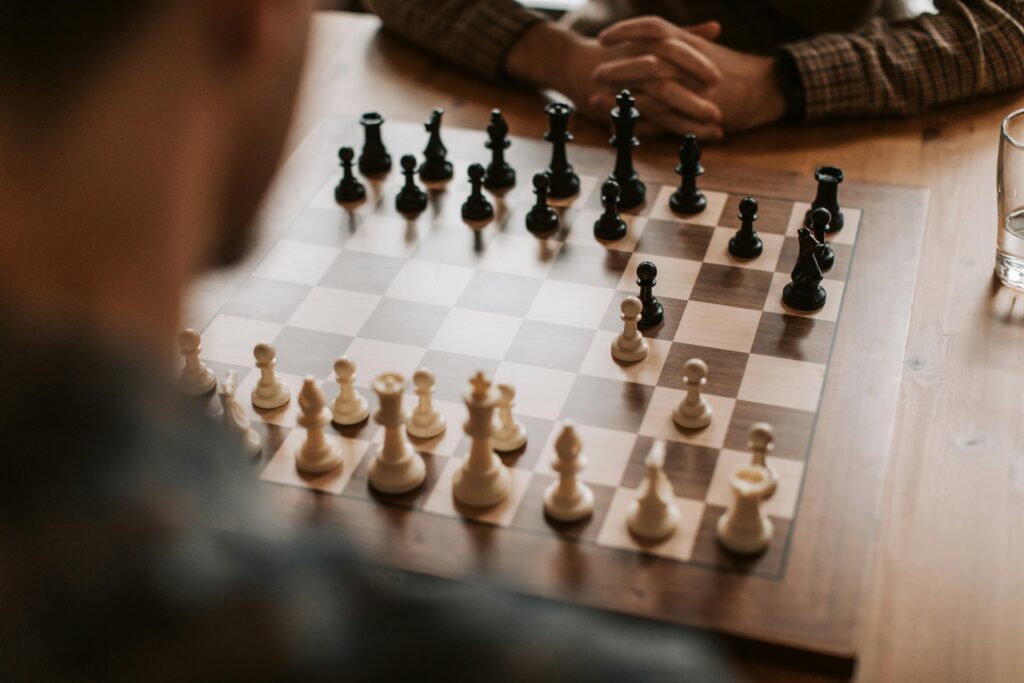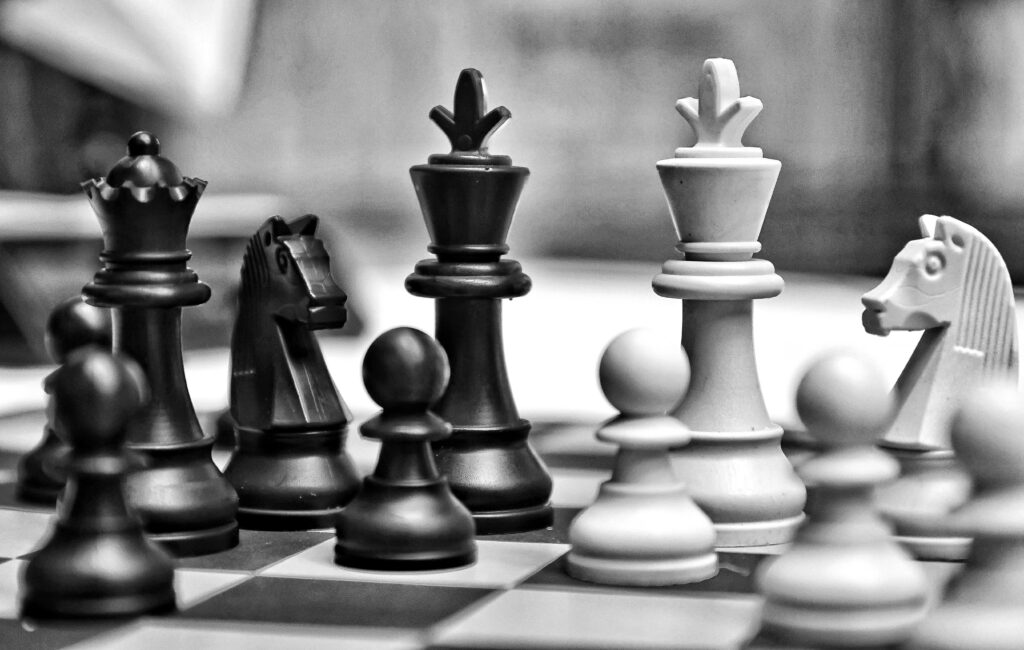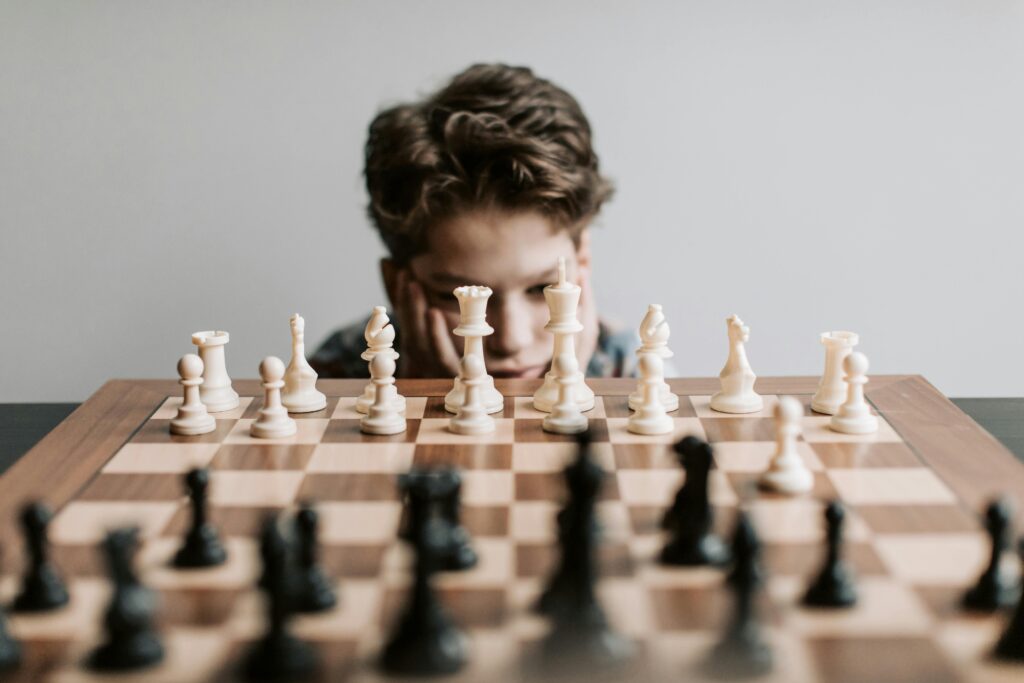Imagine your child sitting in front of a chessboard. Their eyes focused, their mind sharp, their heart calm. That’s not just a game. That’s your child growing into a thinker, a problem-solver, a quiet leader. And it all begins with the right coach.
Online Chess Training
The Landscape of Chess Training in Braunstone and Why Online Chess Training is the Right Choice
Braunstone is a warm and friendly part of Leicester. It’s filled with caring families, good schools, and a growing number of young chess lovers. But if you look closely, you’ll notice something missing — strong, structured chess training.
You might find a few local clubs. Some might meet at a school. Others might gather at a library or community hall. But most of these places don’t follow a plan. They don’t offer steady progress. There’s no set curriculum, no long-term focus, and no expert guidance week after week.
And that’s where online chess training changes everything.
With online learning, your child isn’t limited to the coach who happens to live nearby. They’re learning from the best coaches — people who live in different cities, or even countries. And more than that, they’re learning inside a plan. A plan that grows with them.
Online chess schools give structure. They track progress. They don’t just show tactics — they build habits, focus, and deep thinking. They help kids stay curious and confident, not just in games, but in life.
So even if you live in Braunstone, your child can still have the best chess training in the world — right from your living room.
And no school does this better than Global School of Chess.
How Global School of Chess is the Best Choice When It Comes to Chess Training in Braunstone
At Global School of Chess, we don’t just teach chess. We build thinkers.
We offer live, interactive classes led by real chess masters. Not just people who play well — but people who teach well. Every coach is FIDE-certified, which means they’ve been trained and tested to teach chess at the highest level.
But it’s not just about the titles. It’s how we teach.
We meet each student where they are. Some kids are just starting. Others are already winning tournaments. We build a path for both. We offer small group lessons, private one-on-one coaching, fun practice games, and regular tournaments — all online.
We also follow a curriculum. That means every student learns in steps, from simple checkmates to deep strategy. They don’t just learn moves. They learn how to think. How to plan. How to stay calm under pressure. These are lessons that help on the board — and off it, too.
And we’re global. Students from nine countries join us. That means your child doesn’t just play kids from around the corner. They meet players from around the world. They grow, they compete, they connect.
Best of all, it’s all online. That means no driving. No rushing. No missed lessons. Just open your laptop — and let the learning begin.
That’s why families in Braunstone — and beyond — are choosing Global School of Chess.
Offline Chess Training
In many towns and cities like Braunstone, chess coaching has traditionally meant one thing — gathering in a room once a week with boards, clocks, and a handful of students. It’s familiar. It feels warm.
But as times change, it’s becoming clear that offline chess training, in its current form, needs to evolve to truly serve today’s families and learners.
Let’s talk about why.
Offline chess training often struggles with consistency. Coaches may change venues, cancel due to illness, or be unavailable during holidays. When that happens, kids miss valuable learning time.
Unlike online programs that offer makeup classes or recorded sessions, offline formats often don’t give that safety net. If a child misses a week — or two — their growth gets delayed.
Also, offline sessions are usually limited to just one or two hours a week. That’s not enough time to cover serious content, give personalized attention, and review games thoroughly. With multiple students and mixed levels in the same room, most offline coaches spend their time putting out fires rather than giving deep, meaningful instruction.
Now, here’s where it gets strategic — especially if you’re a local chess business reading this.
Offline academies can improve by blending formats. That’s right — you don’t have to go fully online. But you do need to adapt.
If you run a local chess club, here’s some actionable advice to strengthen your offering:
1. Pair Offline with Digital: After every in-person session, send students a follow-up email with game analysis, puzzle homework, or video links. Keep the learning going between classes.
2. Use Online Tools to Track Progress: Use free tools like Lichess Study or Chess.com Classroom to track student games. Keep notes. Build student profiles. Let parents see how their child is doing.
3. Set Up Hybrid Events: Try hosting hybrid tournaments where kids play in-person but submit their games online for review by stronger players or coaches. Add layers of value beyond just “showing up.”
4. Create a Curriculum: Don’t just teach what you feel like that day. Build a monthly or quarterly plan. Share it with parents. Explain what each class is trying to teach and how it builds on the last.
5. Offer Coaching Tiers: Not every student is the same. Some need more. Some need less. Create different packages — beginner, intermediate, and advanced — and adjust the coach-student ratio based on level.
For parents — if you do choose an offline academy, ask questions:
- “What’s your curriculum?”
- “How do you track my child’s growth?”
- “What happens if we miss a class?”
- “How often does my child get personal feedback?”
If you don’t get clear answers, that’s your sign to look elsewhere — or better yet, give online training a try.
Because here’s the truth: chess is changing. And smart training — the kind that helps kids become better players and better thinkers — must be flexible, intentional, and deeply student-focused.
Offline clubs can be part of that future — if they are willing to grow with the times.
Drawbacks of Offline Chess Training
Offline chess training has been around for decades. It’s what many of us grew up with — school chess clubs, library meetups, weekend group lessons. But while those formats hold a nostalgic charm, they come with built-in limitations that modern families and coaching businesses can no longer afford to ignore.
Let’s go beyond the obvious.
One major issue is scalability. Offline training often relies on one coach managing a room full of kids. This means growth is capped by time, space, and energy. If 20 kids sign up, you need more coaches. More rooms. More scheduling. And even then, quality often drops.
For parents, this means your child might be one of many — and personal attention is lost. For businesses, it means hitting a ceiling — fast.
Another key problem is data blindness. Most offline academies don’t track progress in a measurable way. No game archives. No consistent rating system. No easy way to tell if a student is improving or just showing up.
Imagine running a school with no report cards. That’s what many offline clubs look like.
Here’s where it gets highly actionable — especially for local academies that want to stay competitive:
1. Start Using Tech for Insights: Even if your lessons are offline, encourage students to play online games during the week. Use platforms like Lichess or ChessKid. Ask them to share game links, and review those games in class. Now you have data. Now you can show parents real progress.
2. Introduce “Micro-Coaching”: Instead of long, lecture-style lessons, break your session into micro-coaching blocks. 10 minutes of tactics, 10 minutes of openings, 20 minutes of live play, and 10 minutes of feedback. Keeps energy high and attention locked in.

3. Train Coaches in Feedback Delivery: Most offline coaches were never trained in how to teach. They know how to play, sure — but can they explain? Can they listen? Can they inspire? If you’re a business, invest in coach training — not just for content, but for communication.
4. Add a Parent Portal: One of the biggest reasons parents leave offline academies is the lack of updates. Set up a monthly email summary or parent meeting. Let them know what their child learned, where they stand, and what’s next. Build trust through transparency.
5. Offer “Replay Sessions”: Just like online platforms give class recordings, you can create short video recaps of your week’s lesson. A 5-minute voice-over of a sample game you taught. Upload to YouTube, share privately. Kids who missed class still learn. Parents see value.
Offline isn’t broken — but it is outdated.
The biggest risk? Not adapting.
If you’re a parent, the biggest drawback of offline training is invisible progress. You can’t see the roadmap. You can’t see the gaps. You can’t know how far your child could go — or how far behind they really are.
And if you’re a business, the biggest danger is staying comfortable while others innovate.
Online platforms like Global School of Chess are not just a new option — they are setting a new standard.
If you want to compete, don’t just resist change. Lead it.
Best Chess Academies in Braunstone, Leicester
Global School of Chess
When it comes to learning chess the right way — with care, clarity, and long-term growth — nothing compares to the Global School of Chess.
This isn’t just a coaching center. It’s a full learning experience.
Let’s start with the coaches. Every coach here is FIDE-certified. That means they don’t just play chess at a high level — they understand it deeply. More importantly, they know how to teach it in a way that’s fun, simple, and unforgettable.
The coaches are warm, patient, and encouraging. They know that every child is different. Some kids ask a lot of questions. Others stay quiet and think. Some love to attack. Others play slow and safe. At Global School of Chess, coaches don’t force students into one style. They help them grow in their own way.
Classes are live and fully interactive. That means students don’t just watch — they ask, answer, try, and learn by doing. Whether your child is in a group class or a private one-on-one lesson, they’ll get full attention and helpful feedback.
And the lessons aren’t random. They follow a step-by-step curriculum. New students begin with basics — how each piece moves, how to checkmate, how to spot tactics. As they grow, they move to deeper lessons — strategy, endgames, tournament prep, and more.

Each class builds on the last. Each student is tracked. And progress is shared with parents, so you always know how your child is doing.
We also host online tournaments every two weeks. These events are friendly, fun, and exciting. Students play against others their age and level. Coaches watch games live and give feedback after. It’s a great way to learn — and a great way to grow.
And there’s more.
Global School of Chess is home to a real global family. We have students from nine countries across four continents. That means your child gets to play and learn with students from all around the world. They build friendships. They learn about other cultures. They become part of something bigger.
Parents love us because it’s simple. No driving. No stress. Just log in and learn.
And we always begin with a free trial class. No pressure. No payment. Just come and see how it feels.
If you’re in Braunstone and you want the best chess education for your child — not just better than local clubs, but better than anything — Global School of Chess is the clear choice.
Braunstone Chess Club
Located in the heart of Braunstone, this club has been a staple in the local chess community for over 40 years. They offer group coaching sessions and organize regular tournaments, providing a platform for players to engage in competitive play.
However, while Braunstone Chess Club fosters a strong sense of community, it may not provide the structured curriculum and personalized coaching that online platforms like the Global School of Chess offer. The club’s reliance on in-person meetings can also pose challenges for consistent attendance and individualized attention.
Wigston Chess Club
Wigston Chess Club is another prominent name in the Leicester chess scene. With club nights held every Thursday, they cater to a wide range of players, from beginners to advanced.
While the club offers a vibrant environment for chess enthusiasts, it primarily focuses on casual play and league matches. The absence of a structured learning path and limited access to professional coaching can be a drawback for those seeking comprehensive chess education.
Royal Chess Coaching Academy
This academy stands out for its professional approach to chess coaching. They offer online training sessions conducted by experienced tutors, including Grandmasters and International Masters.
While their online presence is commendable, the Royal Chess Coaching Academy may not provide the same level of interactivity and community engagement as the Global School of Chess.

Their focus is more on individual coaching, which might not suit those looking for a more collaborative learning environment.
Leicestershire Junior Chess Club
Meeting most Saturday afternoons at The Oak Centre in Braunstone, this club is dedicated to nurturing young talent. They organize children into groups based on ability and offer coaching sessions followed by competitive play.
While the club provides a good starting point for young players, it may lack the comprehensive curriculum and flexibility that online platforms offer.
The in-person nature of the club can also limit accessibility for some families.
Leicester University Chess Society
Primarily catering to university students, this society offers weekly meetups, league matches, and tournaments. They welcome players of all skill levels and foster a friendly environment for chess enthusiasts.
However, as a university society, their resources and coaching might be limited compared to dedicated chess academies. The focus is more on casual play and social interaction rather than structured learning.
Why Online Chess Training is The Future
Let’s be honest. The world has changed. And so has learning.
Not long ago, if you wanted to learn chess, you had to find someone nearby. A school club. A retired player. Maybe a weekend coach. It was limited by time, place, and who happened to live near you.
Now? Everything is different.
With online chess training, your child can learn from the best teachers, follow a proven plan, and grow faster — all from home.

But why is it the future?
Because it works better.
Think about it. In online training, lessons are planned. Coaches are trained. Each student gets the attention they need. Every game is saved and reviewed. Every mistake becomes a learning moment. Every win builds confidence.
And your child doesn’t just learn “how” to play. They learn “why.” Why this move is better. Why that opening works. Why calm thinking beats rushing. It’s not just chess — it’s thinking smart.
And parents love it, too. You don’t have to drive anywhere. You don’t have to sit in parking lots. You can peek in anytime, see how your child is doing, and even learn a bit yourself.
You also get flexibility. Busy week? Need a change in timing? Online academies can adjust. Missed a class? Watch the recording. Want extra practice? Join an online tournament. Everything is made to fit your life.
And here’s the big one — results.
Students who train online with structure, with top coaches, and with steady feedback — like at the Global School of Chess — get better. They win more games. They think more clearly. They grow more confident.
That’s why more and more families in Braunstone — and around the world — are choosing online.
Not because it’s easier.
But because it’s better.
How Global School of Chess Leads the Online Chess Training Landscape
There are many chess schools out there. But only one is changing the way kids learn and love chess — all across the world.
That’s Global School of Chess.
What makes us different? Everything.
Let’s start with how we teach. At Global School of Chess, teaching isn’t random. It’s not guesswork. It’s a carefully designed curriculum. That means your child learns step-by-step, from beginner basics to advanced strategies. Each level builds on the last. No skipping. No confusion. Just steady growth.
Then there’s our team. Every coach is FIDE-certified. That’s not just a fancy word. It means they’ve been tested by the world’s top chess body. These coaches don’t just play chess — they teach it. With patience. With heart. With a real love for helping kids succeed.

And let’s talk about what happens in a lesson.
Your child logs in. They see their coach. They see their classmates. They talk. They ask. They try. They learn. It’s not a lecture. It’s a conversation. A back-and-forth that keeps them engaged and thinking.
We use tools that make learning fun. We show real examples. We watch real games. We play puzzles. We laugh. And we learn — a lot.
After class, the learning doesn’t stop. Students get notes. Tips. Extra games to play. Coaches watch their progress and adjust lessons to fit. Parents get updates so they always know how their child is doing.
And every two weeks, we hold online tournaments. These are friendly, exciting competitions. They’re a chance to try new things, meet new friends, and learn from real games.
But maybe the best part?
It’s all online.
That means no travel. No missed classes. No wasted time. Just simple, joyful learning right from your home.
And we don’t just serve one country. We’re global. Kids from nine countries and four continents join us. That means your child plays with real people from real places — building real friendships.
They learn to win with grace. Lose with courage. And think through problems with calm and confidence.
This is what Global School of Chess does.
We don’t just teach chess.
We build minds. We build focus. We build life skills — the kind that help in school, in sports, in every part of growing up.

And it all starts with one small step.
See how your child feels. No pressure. Just one joyful, eye-opening hour.
Wrapping It Up
Chess is more than just a game. It’s a quiet teacher. It builds focus, patience, and calm thinking. It helps kids sit still, plan ahead, and bounce back after setbacks. It teaches them how to win with grace and lose with courage. And the right coach can turn a child’s first move into a lifelong love for learning.

